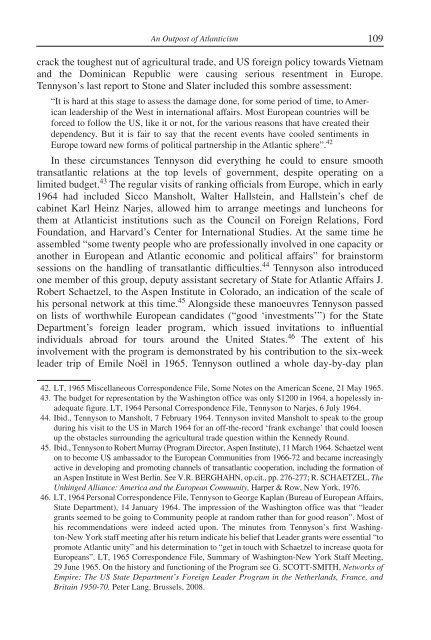2008, Volume 14, N°2 - Centre d'études et de recherches ...
2008, Volume 14, N°2 - Centre d'études et de recherches ...
2008, Volume 14, N°2 - Centre d'études et de recherches ...
You also want an ePaper? Increase the reach of your titles
YUMPU automatically turns print PDFs into web optimized ePapers that Google loves.
An Outpost of Atlanticism 109<br />
crack the toughest nut of agricultural tra<strong>de</strong>, and US foreign policy towards Vi<strong>et</strong>nam<br />
and the Dominican Republic were causing serious resentment in Europe.<br />
Tennyson’s last report to Stone and Slater inclu<strong>de</strong>d this sombre assessment:<br />
“It is hard at this stage to assess the damage done, for some period of time, to American<br />
lea<strong>de</strong>rship of the West in international affairs. Most European countries will be<br />
forced to follow the US, like it or not, for the various reasons that have created their<br />
<strong>de</strong>pen<strong>de</strong>ncy. But it is fair to say that the recent events have cooled sentiments in<br />
Europe toward new forms of political partnership in the Atlantic sphere”. 42<br />
In these circumstances Tennyson did everything he could to ensure smooth<br />
transatlantic relations at the top levels of government, <strong>de</strong>spite operating on a<br />
limited budg<strong>et</strong>. 43 The regular visits of ranking officials from Europe, which in early<br />
1964 had inclu<strong>de</strong>d Sicco Mansholt, Walter Hallstein, and Hallstein’s chef <strong>de</strong><br />
cabin<strong>et</strong> Karl Heinz Narjes, allowed him to arrange me<strong>et</strong>ings and luncheons for<br />
them at Atlanticist institutions such as the Council on Foreign Relations, Ford<br />
Foundation, and Harvard’s Center for International Studies. At the same time he<br />
assembled “some twenty people who are professionally involved in one capacity or<br />
another in European and Atlantic economic and political affairs” for brainstorm<br />
sessions on the handling of transatlantic difficulties. 44 Tennyson also introduced<br />
one member of this group, <strong>de</strong>puty assistant secr<strong>et</strong>ary of State for Atlantic Affairs J.<br />
Robert Scha<strong>et</strong>zel, to the Aspen Institute in Colorado, an indication of the scale of<br />
his personal n<strong>et</strong>work at this time. 45 Alongsi<strong>de</strong> these manoeuvres Tennyson passed<br />
on lists of worthwhile European candidates (“good ‘investments’”) for the State<br />
Department’s foreign lea<strong>de</strong>r program, which issued invitations to influential<br />
individuals abroad for tours around the United States. 46 The extent of his<br />
involvement with the program is <strong>de</strong>monstrated by his contribution to the six-week<br />
lea<strong>de</strong>r trip of Emile Noël in 1965. Tennyson outlined a whole day-by-day plan<br />
42. LT, 1965 Miscellaneous Correspon<strong>de</strong>nce File, Some Notes on the American Scene, 21 May 1965.<br />
43. The budg<strong>et</strong> for representation by the Washington office was only $1200 in 1964, a hopelessly ina<strong>de</strong>quate<br />
figure. LT, 1964 Personal Correspon<strong>de</strong>nce File, Tennyson to Narjes, 6 July 1964.<br />
44. Ibid., Tennyson to Mansholt, 7 February 1964. Tennyson invited Mansholt to speak to the group<br />
during his visit to the US in March 1964 for an off-the-record ‘frank exchange’ that could loosen<br />
up the obstacles surrounding the agricultural tra<strong>de</strong> question within the Kennedy Round.<br />
45. Ibid., Tennyson to Robert Murray (Program Director, Aspen Institute), 11 March 1964. Scha<strong>et</strong>zel went<br />
on to become US ambassador to the European Communities from 1966-72 and became increasingly<br />
active in <strong>de</strong>veloping and promoting channels of transatlantic cooperation, including the formation of<br />
an Aspen Institute in West Berlin. See V.R. BERGHAHN, op.cit., pp. 276-277; R. SCHAETZEL, The<br />
Unhinged Alliance: America and the European Community, Harper & Row, New York, 1976.<br />
46. LT, 1964 Personal Correspon<strong>de</strong>nce File, Tennyson to George Kaplan (Bureau of European Affairs,<br />
State Department), <strong>14</strong> January 1964. The impression of the Washington office was that “lea<strong>de</strong>r<br />
grants seemed to be going to Community people at random rather than for good reason”. Most of<br />
his recommendations were in<strong>de</strong>ed acted upon. The minutes from Tennyson’s first Washington-New<br />
York staff me<strong>et</strong>ing after his r<strong>et</strong>urn indicate his belief that Lea<strong>de</strong>r grants were essential “to<br />
promote Atlantic unity” and his d<strong>et</strong>ermination to “g<strong>et</strong> in touch with Scha<strong>et</strong>zel to increase quota for<br />
Europeans”. LT, 1965 Correspon<strong>de</strong>nce File, Summary of Washington-New York Staff Me<strong>et</strong>ing,<br />
29 June 1965. On the history and functioning of the Program see G. SCOTT-SMITH, N<strong>et</strong>works of<br />
Empire: The US State Department’s Foreign Lea<strong>de</strong>r Program in the N<strong>et</strong>herlands, France, and<br />
Britain 1950-70, P<strong>et</strong>er Lang, Brussels, <strong>2008</strong>.

















